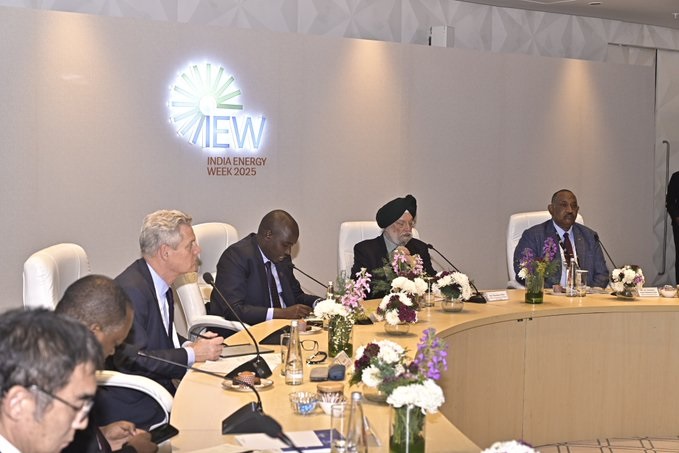India Energy Week 2025 showcases India’s Clean Cooking Gas Model
This can be a blueprint for the Global South
Union Minister of Petroleum and Natural Gas, Hardeep Singh Puri chaired
a Ministerial Roundtable on Clean Cooking on the second day of India Energy
Week 2025. Puri highlighted India’s remarkable success in ensuring universal
access to clean cooking gas through targeted subsidies, strong political will,
digitization of distribution networks by Oil Marketing Companies (OMCs), and
nationwide campaigns promoting cultural shifts towards clean cooking.
The session brought together representatives from Brazil, Tanzania,
Malawi, Sudan, Nepal, and industry leaders including the International Energy
Agency (IEA), Total Energy, and Boston Consulting Group (BCG).
Puri emphasised that India’s model is not only successful but also
highly replicable in other Global South nations facing similar energy access
challenges. The Union Minister noted that under India's Pradhan Mantri Ujjwala
Yojana (PMUY), beneficiaries receive LPG access at a highly affordable cost of
just 7 cents per day, while other consumers can avail themselves of clean
cooking fuel at 15 cents per day. This affordability has been a game-changer in
driving widespread adoption.
During the discussion, international representatives shared their
experiences and challenges in expanding access to clean cooking solutions. Dkt.
Doto Mashaka Biteko, Deputy Prime Minister and Minister of Energy, Tanzania
outlined its strategy to enable 80 per cent of households to transition to
clean cooking by 2030, leveraging subsidies and a mix of energy sources,
including LPG, natural gas, and biogas. However, he acknowledged significant
challenges, including financing constraints, the high cost of infrastructure, and
the need for regulatory reforms to encourage private-sector participation.
HE Dr Mohieldien Naiem Mohamed Saied, Minister of Energy and Oil, Sudan,
emphasized the need for private sector engagement to bridge gaps in LPG supply,
as the country still imports a significant portion of its energy needs.
Encouraging local cylinder production and ensuring cost-effective imports
remain key hurdles in achieving broader adoption. Representatives of Rwanda and
Nepal shared their efforts in reducing firewood dependency through electric
stoves and biogas expansion.
Mary Burce Warlick, Deputy Executive Director of IEA noted that India’s
success offers valuable lessons for other countries, particularly in tackling
challenges related to affordability, access, and infrastructure. She further
emphasized the role of concessional financing and public-private partnerships
(PPP) in expanding clean cooking access globally. Addressing cultural
acceptance and regulatory adjustments, such as tax reductions, were also
highlighted as crucial measures for large-scale adoption.
Rahool Panandiker, Partner at Boston Consulting Group (BCG) highlighted
India’s clean cooking transformation, underscoring its strong political
commitment, effective subsidy targeting, and robust public awareness campaigns.
He further credited India's Oil Marketing Companies (OMCs) for enabling
last-mile LPG delivery through digital platforms, making adoption seamless.
Panadiker also underscored the need for refining the cylinder refill model to
ensure sustained usage and balancing affordability with economic
sustainability.
Responding to the potential of solar cookers in expanding clean cooking
technologies across the Global South, Puri highlighted that IOCL’s advanced
solar cookers, featuring integrated solar panels, are priced at approximately
$500 per unit with no additional costs over their lifecycle. The Union Minister
added that while the current price point remains a challenge for widespread
adoption, leveraging carbon financing and collaborating with the private sector
could drive costs down, making solar cooking a viable alternative for millions.
This initiative aligns with India’s broader efforts to diversify clean
cooking options beyond LPG, reinforcing the country’s commitment to reducing
reliance on traditional biomass fuels and cutting carbon emissions.
Puri concluded the discussion by reaffirming India’s commitment to
supporting energy access initiatives worldwide. He underscored that the Indian
model, backed by smart subsidies and sustainable policies, provides a scalable
solution for other developing nations striving to achieve clean cooking access.
He stressed that achieving universal clean cooking access is not merely an
economic imperative but a moral one, given the severe health and environmental
impacts of traditional biomass cooking.
This roundtable reaffirmed India’s position as a global leader in energy
transition and clean cooking solutions, setting the stage for greater
international cooperation in achieving universal access to clean energy.
India Energy Week was envisioned as more than just another industry
conference—it was designed to be a dynamic platform redefining global energy
dialogues. In just two years, this self-funded initiative has achieved
precisely that, becoming the world’s second-largest energy event. The ongoing third
edition being held at Yashobhoomi, New Delhi. was inaugurated on 11 February by
the PM via video message. IEW, concluding on 14 February represents a
significant milestone in shaping the global energy narrative.


